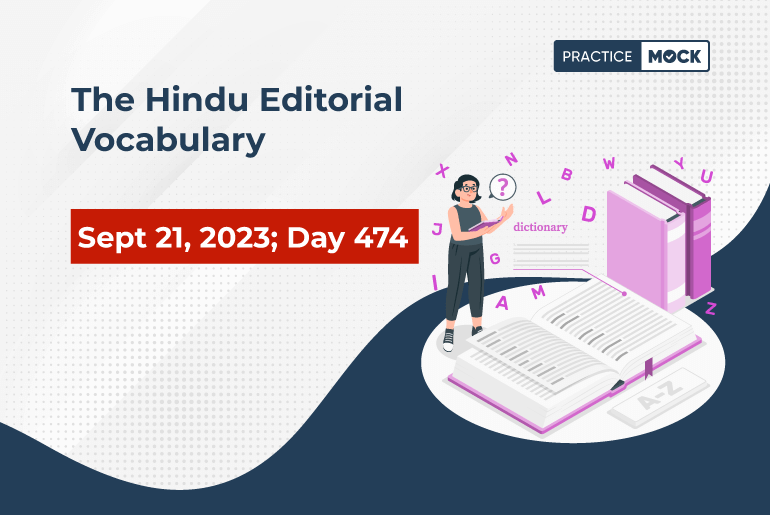

| Difficult Word/ Phrase | Contextual Sense |
| Legislate | Make laws, bills, etc. or bring into effect by legislation |
| Shatter | Damage or destroy |
| Glass ceiling | the way in which unfair attitudes and practices can prevent women, or other groups, from getting the best jobs in a particular area of work, an organization, etc. although there are no official laws or rules to prevent them getting these jobs |
| Stark | Extreme |
| Fraught | filled with something unpleasant |
| Laudatory | Full of or giving praise |
| Delimitation | the action of fixing the boundary or limits of something |
| There’s the rub | said to mean that there is a problem or contradiction which is difficult or impossible to deal with |
| Set aside | Give or assign a resource to a particular person or cause |
| Ruse | a trick or clever plan |
| Fine-tune | make small adjustments to (something) in order to achieve the best or a desired performance |
| Tokenism | the practice of making only a perfunctory or symbolic effort to do a particular thing, especially by recruiting a small number of people from under-represented groups in order to give the appearance of sexual or racial equality within a workforce |
| Imbibe | Receive into the mind and retain |
| Patriarchal | controlled by men rather than women |
| Falter | to become weak or move in a way that is not steady |
| Institute | to introduce a system, policy, etc., or start a process |
Legislating (Make laws, bills, etc. or bring into effect by legislation) change: On the passage of the women’s reservation bill in the Lok Sabha
The Women’s Reservation Bill must be passed in its current form without further delay
The passage of the women’s reservation bill in the Lok Sabha almost three decades after it was first tabled in Parliament is a welcome move that can finally shatter (Damage or destroy) a political glass ceiling (the way in which unfair attitudes and practices can prevent women, or other groups, from getting the best jobs in a particular area of work, an organization, etc. although there are no official laws or rules to prevent them getting these jobs). With women Members of Parliament comprising only about 15% of the strength of the Lok Sabha, the gender inequality in political representation is stark (extreme) and disturbing. The 128th Constitution Amendment Bill, or the Nari Shakti Vandan Adhiniyam, seeks to amend this by reserving a third of the seats in the Lok Sabha and legislative Assemblies for women. It has a 15-year sunset clause for the quota, that can be extended. Considering the fraught (filled with something unpleasant) history of the struggle for women’s reservation, and several false starts despite the Rajya Sabha passing it in 2010, it is laudatory (Full of or giving praise) that the first Bill to be introduced in the new Sansad Bhavan has been passed in the Lok Sabha. But its implementation will be delayed as it has been tied to two factors, delimitation (the action of fixing the boundary or limits of something) and the Census, and therein lies the rub (There’s the rub is said to mean that there is a problem or contradiction which is difficult or impossible to deal with). It is unfortunate that implementation is being linked to delimitation, for the principle of having a third of seats reserved for women has nothing to do with the territorial limits of constituencies or the number of Assembly or Lok Sabha constituencies in each State.
Women will thus not have access to 33% reservation in the 2024 general election. The Bill also mandates that as nearly as one-third of the seats reserved for Scheduled Castes and Scheduled Tribes will be set aside (Give or assign a resource to a particular person or cause) for women. The Opposition is demanding an internal quota for women of Other Backward Classes, but this should not be used as a ruse (a trick or clever plan) to delay implementation. In the meantime, proposals should be fine tuned (make small adjustments to (something) in order to achieve the best or a desired performance) to ensure that when it becomes an Act, it is not mere tokenism (the practice of making only a perfunctory or symbolic effort to do a particular thing, especially by recruiting a small number of people from under-represented groups in order to give the appearance of sexual or racial equality within a workforce) for women’s political representation. It is a fact that local bodies are better represented, with the share of women in panchayati raj institutions well above 50% in several States. Lessons must be imbibed (Receive into the mind and retain) on how women at the grassroots level have broken all sorts of barriers, from patriarchal (controlled by men rather than women) mindsets at home to not being taken seriously in their official duties, and made a difference. Women struggle on so many other counts: they have uneven access to health, nutrition and education, there is a lack of safe places, women are also falling out of the workforce — among the G-20 countries, India’s female labour force participation is the lowest at 24%. India, which gave women voting rights at the very outset, should not falter (to become weak or move in a way that is not steady) when it comes to ensuring better political representation for women. For growth, and instituting (to introduce a system, policy, etc., or start a process) change in key areas, women need to have their say.
Want to improve your vocabulary further? Download the Lists of Word-Meanings of Previous Months here.
Recent Posts
SBI CBO Computer Aptitude Previous Year Question Paper, Download Free PDF
Here we are providing the SBI CBO Computer Aptitude Previous Year Question Paper. Candidates can…
Mensuration SSC CGL Questions, Basic Concept & Free Topic Tests
In this blog, we have provided the concept of the Mensuration SSC CGL Questions Exam…
SSC CGL Active Passive Questions PDF Download for Free
In this blog, we have provided the SSC CGL Active Passive Questions PDF. Practice free…
SSC CGL Practice Quiz With Answers, Attempt Daily Topic-wise Quiz
In this blog, we have provided the SSC CGL Topic-Wise Quiz for free. Candidates will…
Arithmetic Most Important Questions for RRB PO 2025 Exam, Download Free PDF
In this article we are providing the 150+ Arithmetic Questions for RRB PO Based On…
Simplification Expected Ques for RRB PO, Check Strategy to Solve Questions in 10 sec
In this article, we are providing a strategy to solve RRB PO Simplification in less…


